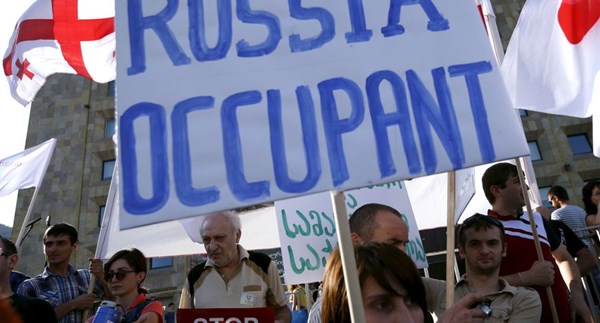Protests were held in Tbilisi against Russia’s changes to South Ossetian border
On Saturday July 8th, by the State Chancellery of Georgia’s offices, there was a protest against the installation by the Russian border service of a de facto border of the self-proclaimed South Ossetia, as reported by Georgia Online.
"Activists of the youth wing of the European Georgia party demanded an end to the ongoing creation of borders in Georgian territories and are outraged by the authorities' inaction," the statement said.
Protesters carried barbed wire ahead of them as a symbol of the occupation. In their hands they held placards which said: "Russia is our enemy!" and "Russia is killing!"
It was noted that this is not the only protest against the occupation, which was held on Saturday in Georgia. Through social networks, a protest march from Akhalsopeli to Bershuti was organized, where, according to local residents, a new occupation banner was recently installed.
The procession started under the slogan "No to occupation, Russia is an occupier!" Students of Georgian universities, representatives of the public, and various non-governmental organizations took part in the march.
According to the participants of the protest, its goal is to protest the advancement of the border line by the Russian military.
Earlier it was reported that the Russian military installed another green banner indicating the so-called border on the outskirts of the Georgian villages of Bershuti and Sobisi, where land owned by local residents are located, moving it from the prior designation of the so-called border by another 500 meters.
Georgian authorities said that they are extremely concerned about the latest developments on the occupation line in the Tskhinvali region.
Tbilisi severed diplomatic relations with Moscow in August 2008 after Russia recognized the sovereignty of Abkhazia and South Ossetia - the two autonomous regions that were part of Georgia and sought independence from it even before the collapse of the USSR. The European Union also does not recognize the independence of South Ossetia and Abkhazia, declaring support for the territorial integrity and sovereignty of Georgia.
The legal status of South Ossetia as an independent republic was recognized by only five states - Russia, Venezuela, Nicaragua, Nauru, and Tuvalu.
In March 2015, Russian President Vladimir Putin and the head of the unrecognized South Ossetia, Leonid Tibilov, signed an agreement on cooperation and integration. In March 2017, the Russian government approved an agreement on the inclusion of the military of South Ossetia in the Russian army.
